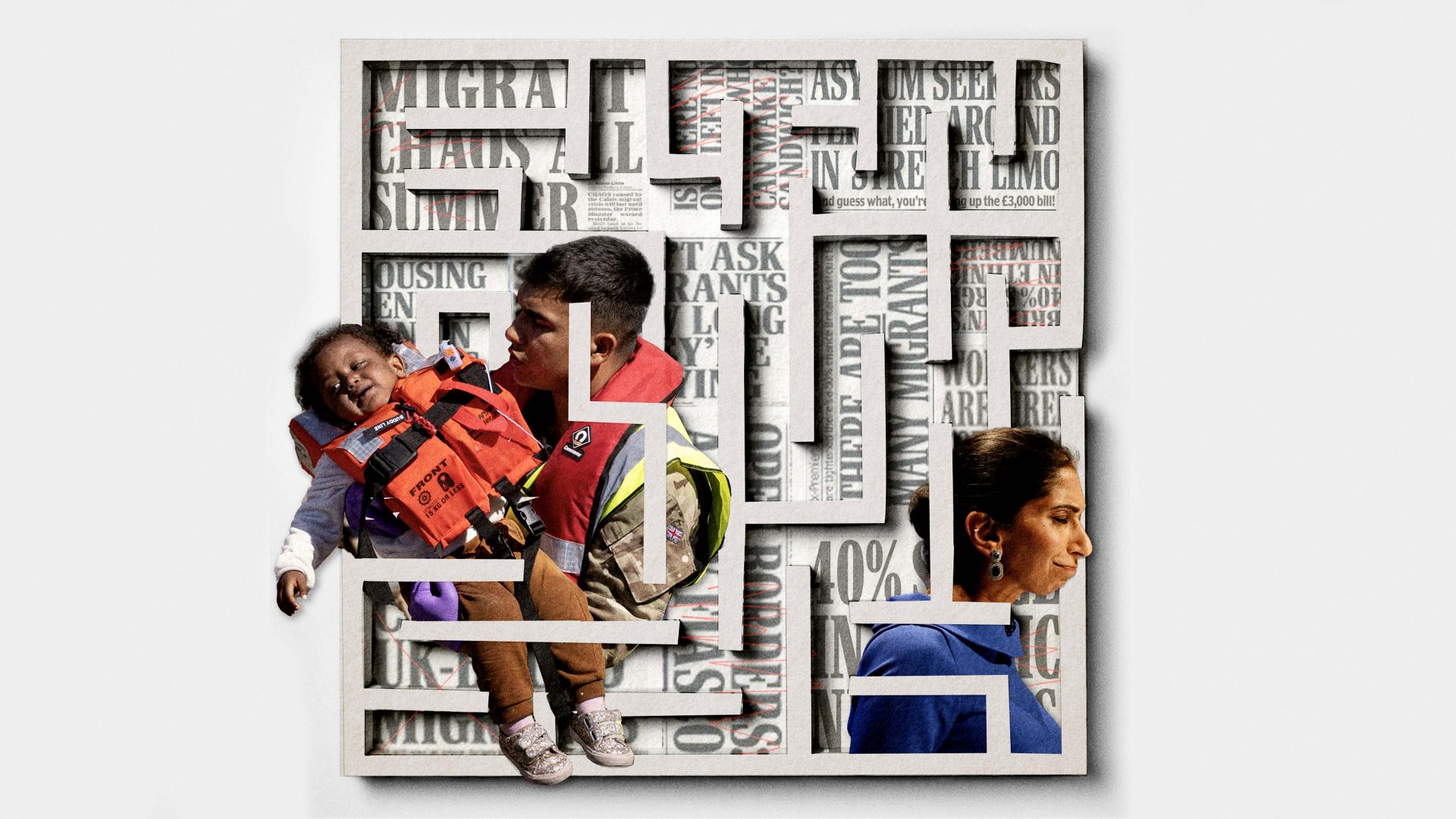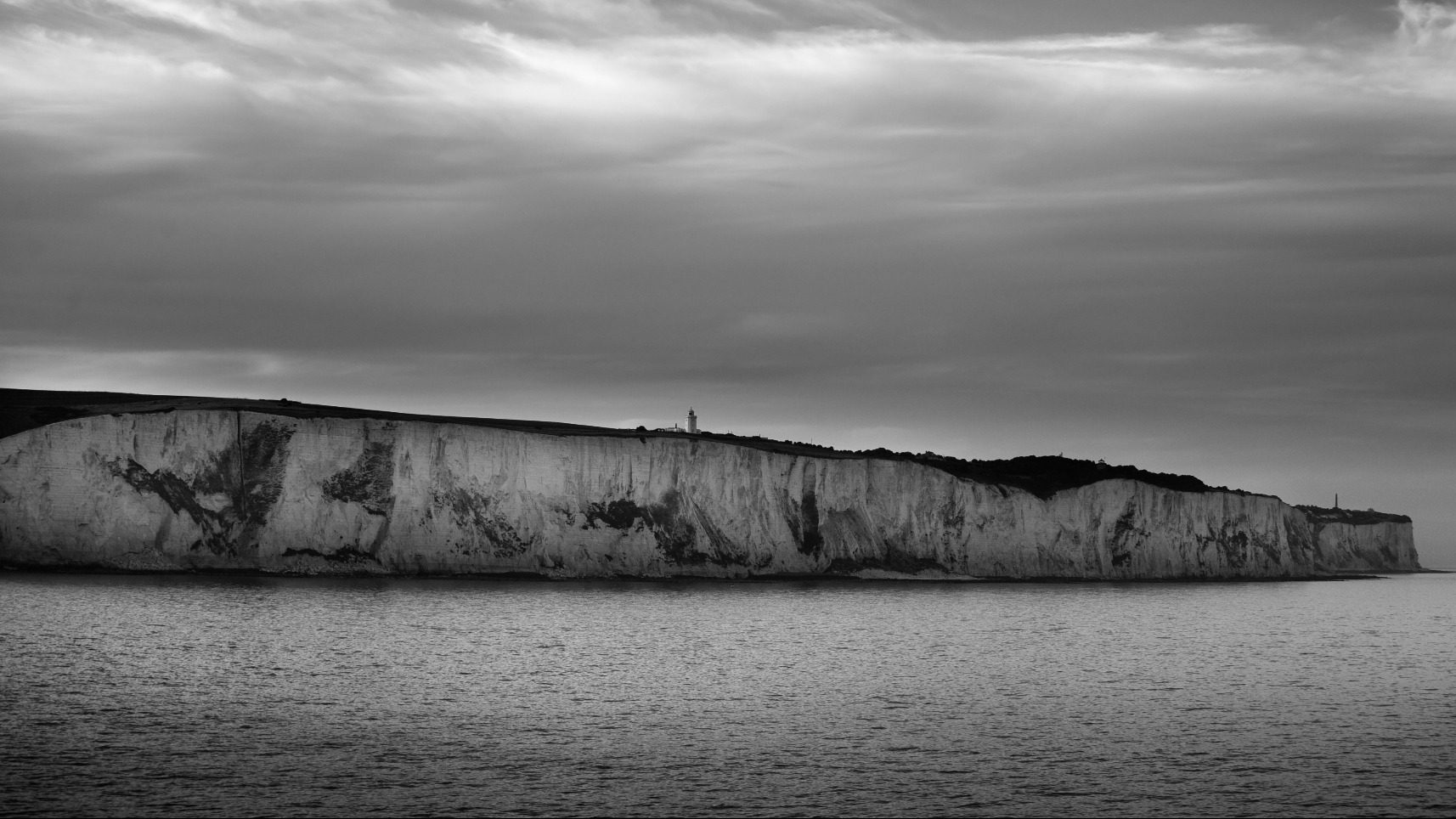Everyone knows that pictures tell a story in a way that words rarely can – but it is all too easy to forget that it is very hard to control exactly what story it is that a picture tells. So it was for Suella Braverman, who led a taxpayer-funded media jaunt to Rwanda with a selection of hand-picked outlets (excluding the BBC and Guardian, among others) to promote her big idea, which is to send asylum seekers to the east African nation.
Braverman had clearly hoped for a picture of her laughing with a group of her Rwandan guides, a positive image to counteract her nasty public image. What was actually taken appears to show her laughing maniacally in front of the building of what the public is led to believe will be an asylum facility (more on this later).
Pictures sometimes paint a broader, more impressionistic truth than their subjects would hope. But maniacal laughter aside, Braverman’s Rwanda policy is doomed, as is Rishi Sunak’s pledge to stop small boat crossings. Here, we set out what might actually work to remedy the UK’s asylum issues.
1) Accept that this “solution” is no solution
The reality of Suella Braverman’s Rwanda policy is that it’s a confused mess. Everyone knows that in reality it would accept – at most – a few hundred asylum seekers each year, and in doing so would likely breach international law, not least for the principle of “non-refoulement” – that no one should be returned to a country where their life would be at risk, or they would be at risk of serious harm.
By outsourcing the processing of asylum seekers to a third country, the UK would be abdicating an essential responsibility under international law, even leaving aside Rwanda’s own problematic track record on human rights, political freedoms, and LGBT rights. But beyond this, the government’s messaging is baffling.
On the one hand, Braverman spent the weekend praising the design of the site she visited, even asking if she could get some tips for her own home – suggesting that those sent to Rwanda would live in luxury, which surely would be a draw for would-be refugees. Simultaneously, she promises the policy would deter small boats. Which is it?
Even more nonsensically, the site Braverman visited had nothing to do with the UK. It is part of a housing development that was already being built, rather than the result of a UK-Rwanda deal. This too seems telling of Braverman’s approach: smoke and mirrors with nothing behind them.
2) Create safe and legal routes
Actual “solutions” to small boat crossings – which everyone should want to find given the significant risk to life of those on the boats, and the profits extracted by the smugglers from desperate people – look very different to what the government is proposing.
The government has in practice conducted a sadistic bait and switch: ministers say that would-be refugees should arrive by “safe and legal routes”, but have in reality abolished such routes. If you give people no choice but to arrive by small boats, and then demonise small boats, you are not trying to perform your duties per the UN Refugee Convention – you are trying to avoid them.
One surefire way to reduce (though not eliminate) small boat crossings would be to re-establish safe and legal routes to asylum: via applying at certain embassies, or setting up processing centres near particular refugee camps, or in some other way checking eligibility without requiring the risk of death.
The UK receives a relatively small share of asylum seekers versus even most European countries (which in turn receive far less than countries neighbouring major refugee crises), and a majority of people who arrive by small boats are found to be legitimate refugees. Given that, it is clear our current government policy serves primarily to empower and enrich people smugglers, rather than to serve any better purpose.
3) Accept what you cannot change
That said, not everyone crossing on small boats is a legitimate refugee – under the UN convention, you are not eligible for refugee status if you are moving for economic reasons, even if you are fleeing extreme poverty.
The UK has a particular draw for Albanians, many of whom cross on small boats and claim asylum – knowing rejection is almost inevitable – so as to work in the informal economy (or grey market) until their fate is confirmed.
This is because there are strong familial and cultural ties between the UK and Albania, as well as very little in the way of jobs or money outside of the country’s capital. There are small towns in the country where people drive cars with British registration plates as a sign of (relative) wealth, before attending their local British-themed pub.
We will almost certainly not be able to stop people from these regions from wanting to come to Britain – which means there is a choice to be made: do we create some form of US-style lottery for a certain number to come, compromising with reality, or do we continue the current deadly charade?
4) Spread the impact
Part of the toxicity of the asylum debate is that its impacts are disproportionately concentrated in a small number of counties and towns. Coupled with the idea that asylum seekers are in “four-star” hotels and the willingness of right-wing outlets to big up these misconceptions, the politics of asylum have become toxic.
Councils try to spread the distribution of refugees, but these efforts could be stepped up – particularly if the government offered funding to councils that offered to house people while their claims were processed.
The reason asylum seekers are housed in hotels and bed and breakfast accommodation is that they are ineligible to work while their claims are processed – a move designed to discourage people from travelling for economic reasons.
One solution here would be some form of early assessment of whether an asylum claim is likely to be granted, so that those likely to be granted might be given a right to work so they could secure private rental accommodation. This could also be restricted to particular shortage occupations (even if low-skilled), for political acceptability.
Another, of course, would be simply to tackle the ridiculous backlog of claims so that processing is a matter of a month or two, rather than a year or more.
5) Be realistic
Some realism needs to enter into the debate, though – almost no country in the world has entirely closed its borders. The UK is an island, and so has relatively little smuggling across borders versus most of the world – but even with good and constructive reforms, some people will want to enter the country informally. For so long as there is profit to be made in doing so, smugglers will enable that behaviour. Just as we would prefer it if there were no murders, rapes and burglaries, we might prefer it if there was no human trafficking too.
But we should recognise those as impossibilities: when Rishi Sunak stands behind a podium promising to “stop the boats” it looks as ridiculous as if he were standing behind a podium saying “zero murders” – the aspiration might be a fine one, but the goal is impossible.
The government is taking the public for fools by promising something it can never deliver. Part of defusing the issue is to be honest with the public. We can reduce the number of crossings in several ways, and we can do more work to reduce the impact of the crossings, too. We will never stop them entirely.
6) Actually make things better
The government says it wants to get the message across to potential migrants that Britain is not a land of milk and honey. So perhaps one way to stop the boats is to keep on making the UK less desirable as a place to live.
Our housing stock is overpriced and old, real wages have been stagnant since 2008, the NHS is on the brink of collapse, we have under-invested in public transport, and strikes are a weekly occurrence. The UK is rapidly falling behind the rest of Europe as a nation.
That’s one way to reduce the number of people who might want to live here, but is it really the trade-off the British public wants? The reality is that one of the reasons people resent immigration – into which asylum is generally lumped – is that when services are failing, people resent the greater demand for their use.
So the alternative is making things better. If we grow the economy enough, and have services working well enough that people don’t stress about accessing them, concern over immigration reduces – though it does not, of course, fall to zero, as not all concerns are practical.
That is far easier said than done – decent economic growth has escaped the Conservative government for all 13 years of its tenure – but would be the core of a potential long-term solution.
Nothing will stop the boats, but Braverman’s Rwanda policy is the worst of all the options – a fitting flagship for her ministerial career.




